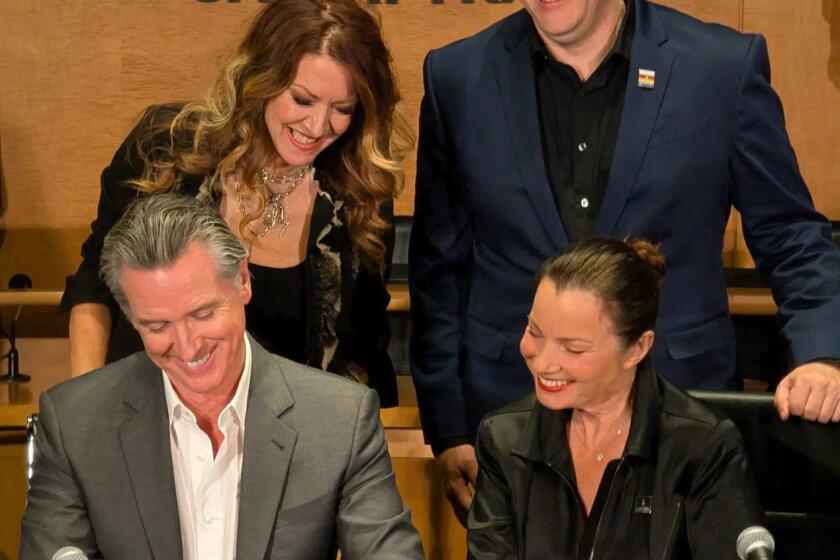High stakes weighed on Web marriage
Google Inc.’s announcement of a service to “make the Web more social” was decidedly casual, or staged to seem that way.
Standing beside a campfire, the company’s engineering director, David Glazer, explained how, through an agreement with Facebook and similar sites, the effort would serve a primal human need.
“We all like huddling around fires, and huddling around food and talking to each other -- people are social,” Glazer, dressed in a red-checked shirt and sneakers, told about 100 people gathered outside the company’s headquarters in Mountain View, Calif., last month. “With Friend Connect we are trying to make that happen everywhere on the Web.”
Within three days of the campfire, a dispute erupted between Google and Facebook, its largest partner in the new service, that reflected the fact that for Web companies there is nothing casual about the business of Internet socializing.
There’s too much money, maybe billions, at stake.
Facebook, the burgeoning social network, abruptly withdrew its support for Google’s Friend Connect, meaning that none of Facebook’s tens of millions of members could sign on to websites using Google’s new service.
Coming so soon after the highly publicized launch, it was an embarrassing rift.
In the common social networks, people communicate, organize and socialize largely within sites -- such as Facebook, MySpace or LinkedIn -- but not outside of them. This model, referred to in geek parlance as the “walled garden,” ensures that social networking sites get traffic and screen time from members, and the accompanying revenue.
Many in the industry are proposing a different model, in which every website would have a social aspect. In this scenario, there would be no need for a person to confine socializing to MySpace or Facebook. People could tap in to their information -- contacts and pictures -- as they roam the Web. The social networking sites would function more like a utility, storing a person’s contacts, photographs and other tidbits.
“Social networking sites are at a major fork in the road,” said Bernard Lunn, a tech and media entrepreneur who writes for ReadWriteWeb, a blog that focuses on tech issues.
Facebook founder Mark Zuckerberg has argued that his site makes human relationships more “efficient.”
Sure, he said in a speech last year, two friends “can communicate off line if one of them picks up the phone to call the other, or if they take some time to hang out, or if they randomly bump into each other. But these methods are all synchronous -- they’re kind of inefficient. In order for them to work, both people have to be paying attention to each other at the same time.”
Until Facebook’s withdrawal, Google’s Friend Connect would have allowed Facebook members to visit other sites using the service and, while there, tap into their Facebook friends list and other information.
To protect privacy, users would use their Facebook user name and password to access their information. That, Google executives explained, is how Friend Connect would make the Web “more social.”
Shortly after the launch, Facebook executives asserted that Google hadn’t briefed them on Friend Connect. And having seen the service, they said, they discovered that it violated Facebook users’ privacy by passing their information to third parties.
“We had not had a chance to review how it worked before it launched,” Facebook’s chief privacy officer, Chris Kelly, said in an interview last week. He declined to detail the company’s privacy concerns.
Glazer said Facebook had been fully briefed on Friend Connect.
“We talked to them before the announcement, we talked to them after, and there was a person from Facebook at the launch,” he said.
Moreover, he noted, the only Facebook information that Friend Connect gives to a third-party site is the person’s public Facebook photograph, and that is done only after a user has logged in with his or her Facebook credentials.
Some observers suspect that Facebook cited privacy concerns as an excuse for pulling out of an agreement it had come to view as a competitive threat.
“What Facebook is after, really, is control over their users,” said Chris Saad, co-founder of DataPortability.org, which advocates for standards for sharing information.
Though Facebook has made moves toward opening its walled garden, Saad said that, from a financial standpoint, the company “has a difficult balancing act to perform.”
On one hand, it would like to keep users on the Facebook site. On the other, users are demanding the ability to utilize their Facebook contacts when they are elsewhere on the Web.



